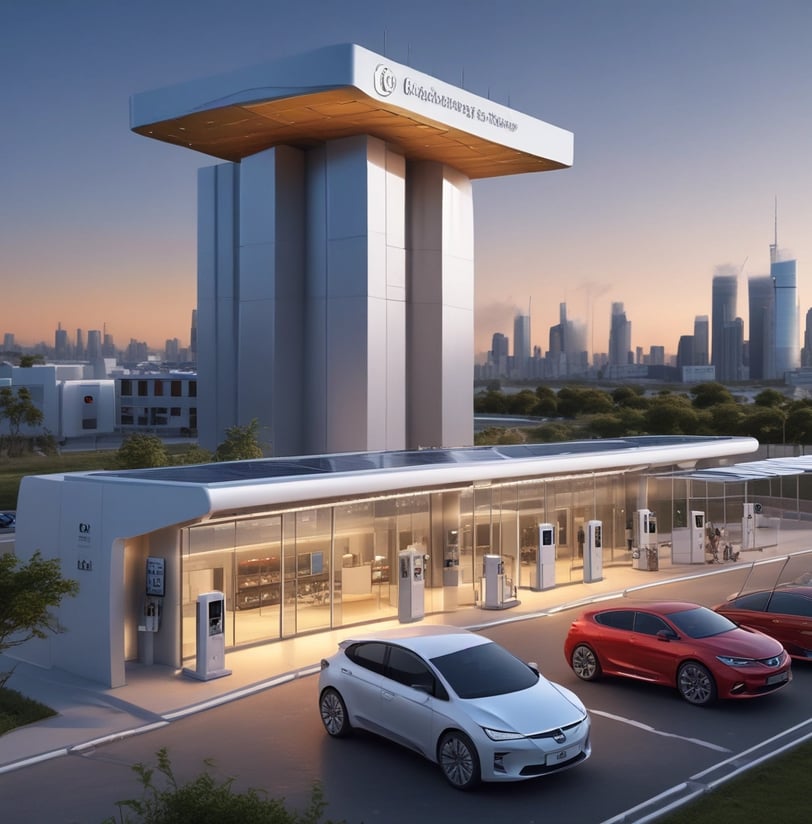“LG Energy Solution and JSW Energy Forge $1.5 Billion Partnership for Revolutionary EV Battery Plant in India!”
LG Energy Solution and JSW Energy have announced a groundbreaking joint venture worth over $1.5 billion to build a cutting-edge EV battery plant in India. With ambitious plans to revolutionize the electric vehicle and energy storage sectors, this collaboration is set to reshape India’s green energy landscape.
BLOG POST
evnovatec.com
12/23/20245 min read


LG Energy Solution and JSW Energy Exploring JV for EV Batteries: A Transformative Step for India’s Green Future.
In an exciting move that promises to accelerate India’s push toward green energy, LG Energy Solution and JSW Energy have officially signed a preliminary agreement to create a joint venture (JV) aimed at manufacturing batteries for electric vehicles (EVs) and renewable energy storage. This partnership, with a combined investment of over $1.5 billion, marks a pivotal moment in the country’s energy transition journey. But what exactly does this mean for the future of clean energy and electric vehicles in India?
1. The Power of Partnership: LG Energy Solution Meets JSW Energy
At the core of this agreement is a collaboration between two giants in their respective industries: LG Energy Solution, a leader in the battery sector, and JSW Energy, a major player in the Indian power sector. LG Energy Solution will bring its cutting-edge battery technology and expertise, while JSW Energy will provide the financial backing and manufacturing support to establish this state-of-the-art facility.
This JV isn’t just about building batteries; it’s about creating a future where electric vehicles are more affordable and accessible, and renewable energy storage is widespread across the country. By combining their strengths, these companies are poised to make a significant impact on both the EV and energy storage markets.
2. The $1.5 Billion Commitment: A Game-Changing Investment
The venture will require a hefty investment exceeding $1.5 billion, which will be used to build a highly advanced, 10-gigawatt-hour (GWh) battery manufacturing plant in India. Of this, JSW Energy is expected to utilize around 70% of the plant’s output for its own energy storage and EV projects. The remaining portion of the production will be used by LG Energy Solution, positioning both companies to serve a rapidly growing demand for EV batteries and storage solutions.
This investment underscores the growing importance of the EV sector in India, where the government is actively encouraging the adoption of electric vehicles as part of its broader commitment to reducing carbon emissions and combating climate change. The joint venture will undoubtedly help meet India’s increasing demand for EV batteries, while simultaneously fostering economic growth and job creation.
3. Strategic Significance: What This Means for JSW Energy
JSW Energy, a prominent player in the Indian power industry, is already positioning itself to manufacture electric vehicles. This partnership with LG Energy Solution is a natural extension of their ambition to become a major player in the green energy space. Not only will the JV allow JSW to produce batteries for its own electric vehicle line, but it will also provide vital energy storage solutions for its Battery Energy Storage Systems (BESS) business.
In addition to enhancing its EV manufacturing capabilities, this collaboration strengthens JSW Group’s green energy portfolio. Last year, JSW Group entered into a joint venture with SAIC Motor, acquiring a 35% stake in the MG Motor India division. This shows that JSW Group is increasingly focused on electric mobility and is well-positioned to leverage the latest in battery technology to lower the cost of EVs for Indian consumers.
4. Expanding the Vision: A Local Supply Chain and Future Growth
The JV is not just about producing batteries; it’s about developing a local supply chain that will support India’s EV industry for years to come. JSW Group, in particular, has been exploring partnerships with global battery manufacturers such as CATL, Panasonic, and Toshiba, with the goal of setting up a battery factory capable of producing 20 GWh of capacity by the end of the decade.
This ambitious plan is a clear indicator of India’s growing interest in creating a sustainable and self-reliant EV ecosystem. With an initial phase of 8 GWh, the factory will ramp up over time to meet the demand for both domestic and international markets. By establishing a robust local manufacturing base, India is positioning itself as a global player in the electric vehicle and energy storage sectors.
5. Why This JV Matters for India’s Green Future
India’s transition to a greener future is gaining momentum, and the partnership between LG Energy Solution and JSW Energy is a crucial step in that direction. By producing affordable, high-quality batteries for electric vehicles and renewable energy storage systems, this JV will help India reduce its dependence on fossil fuels, cut down on pollution, and accelerate the adoption of clean energy technologies.
Not only will this JV help in reducing India’s carbon footprint, but it will also contribute to the nation’s energy security by enabling a more sustainable and resilient energy grid. The ability to store energy generated by renewable sources like solar and wind is key to ensuring a steady power supply, even during times of low generation.
6. The Road Ahead: Potential Challenges and Opportunities
While the potential for this JV is enormous, there are several challenges that need to be overcome. For one, the Indian market for EVs is still in its nascent stages, and a lot of infrastructure needs to be developed to support widespread EV adoption. Charging stations, for example, are still limited, and consumers may hesitate to make the switch to electric vehicles due to concerns about range and charging convenience.
However, with the support of the government and private sector investments like this JV, these challenges can be addressed. The growing demand for EVs, coupled with the cost reduction in battery manufacturing, will make EVs more accessible and affordable for the average consumer. As a result, this joint venture is not only a win for LG Energy Solution and JSW Energy but also for the entire Indian economy, paving the way for a more sustainable future.
FAQ Section
Q1: What is the joint venture between LG Energy Solution and JSW Energy?
A1: The joint venture is a partnership between LG Energy Solution and JSW Energy to establish a battery manufacturing plant in India, focusing on electric vehicles (EVs) and energy storage systems. The investment exceeds $1.5 billion.
Q2: How much of the plant’s production will be used for EV batteries?
A2: JSW Energy will use approximately 70% of the plant’s production for its energy storage and electric vehicle projects, while LG Energy Solution will use the remaining portion.
Q3: What is the capacity of the battery plant being built?
A3: The battery plant will have an initial capacity of 10 gigawatt-hours (GWh), with future expansions planned to meet growing demand.
Q4: How does this JV contribute to India’s green energy goals?
A4: The JV will help reduce India’s dependence on fossil fuels, lower pollution, and foster the growth of renewable energy storage, thus supporting India’s transition to a greener energy future.
Q5: What role does JSW Energy play in this partnership?
A5: JSW Energy is providing the financial investment and manufacturing capabilities, while LG Energy Solution is supplying the technology and expertise to produce batteries for EVs and energy storage systems.
This venture between LG Energy Solution and JSW Energy marks a significant step toward building India’s green energy infrastructure and advancing the country’s electric vehicle market. With their combined expertise, the two companies are set to create a sustainable and innovative future for clean energy and transportation.
